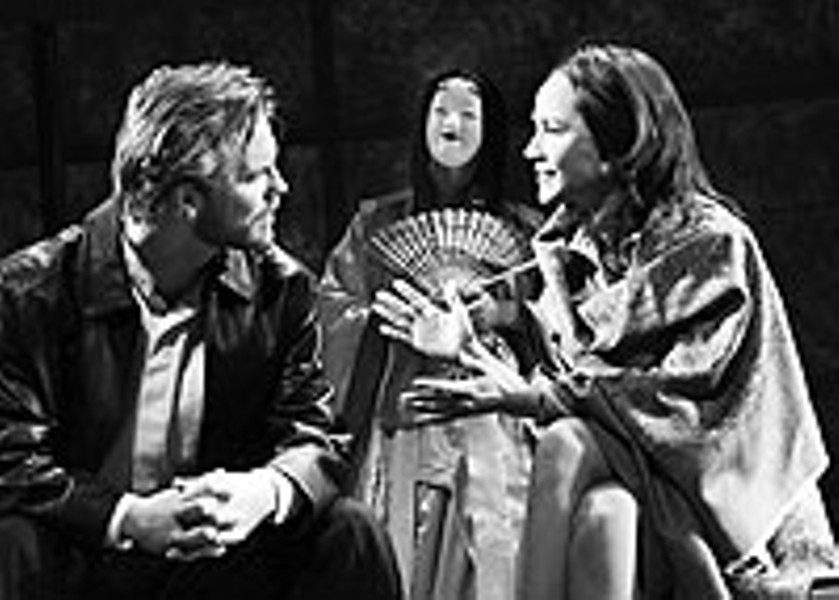In his new movie, The Life of David Gale, Alan Parker transforms the now trite and artificial situation of the condemned inmate on death row into a complex work that suggests several different cinematic possibilities and provides a number of twists and surprises.
Not surprisingly, the film deals at length with the death penalty, a matter of continuing national debate, but refrains from any of the expected preachiness or didacticism. Its ideology, however, actually propels its considerable suspense, making it that extremely rare form, especially in America --- a political thriller. At the same time, and rarer still, in keeping with its representation of academic life, the film explores something like a genuine intellectual argument and a humane philosophical position.
The director constructs his intricate narrative around a series of interviews between the title character --- an academic superstar and philosophy professor at the University of Texas (Kevin Spacey) --- and Bitsey Bloom (Kate Winslet), a hotshot investigative reporter for a national news magazine. The three interviews, conducted the week before his execution, introduce a succession of flashbacks that explain the circumstances and behavior that landed David Gale on death row, convicted of the rape and murder of a friend and colleague, Constance Harraway (Laura Linney). Although skeptical at first, Bloom and her feckless intern, Zack (Gabriel Mann), embark on the seemingly impossible task of digging up the evidence that, according to Gale, will prove him innocent.
The conversations between Gale and Bloom recount the professor's initial fall from grace, which set him up for the charge that led to his death sentence. An attractive graduate student seduces Professor Gale at a wild faculty party (that gathering, and Gale's lecture to an auditorium packed with raptly attentive students, constitute the usual Hollywood sensationalizing of academic life), then falsely accuses him of rape. Although she later drops the charges, the accusation itself, of course, is sufficient to tarnish his brilliant career, destroy his marriage, and turn him into an academic pariah. Desperately missing his young son, unable to find a position anywhere because of the stain on his reputation, he sinks into a profound despair, lubricated by alcohol.
Gale claims that he has been framed for the rape and murder of his friend Constance, because the two of them led an organization called DeathWatch, which fights against the death penalty. (In Texas, where the motto appears to be "cuff 'em and snuff 'em," such organizations stay very busy indeed.) As the two reporters desperately investigate the crime, in the spaces between the flashbacks, so to speak, they discover numerous bits of evidence that appear to clear Gale and implicate someone else. All the while, some mysterious, menacing figure shadows them everywhere.
The film's pointed references to the governor of Texas, his unquestioning adherence to his interpretation of the Bible in his defense of the death penalty, and his general ignorance and stupidity, inevitably remind the viewer of the last governor of that state and his proud record of executions.
The subject and the general situation certainly suggest a peculiar relevance to our time and that place. The movie, however, exploits much of that subject and that relevance for other purposes, including the creation of a carefully planned crime and, consequently, a terrific mystery. Throughout the film, the director plays entirely fair with the viewers, showing all the evidence, allowing the audience to participate fully in the investigation along with the reporters --- sharing their confusion, reacting to the red herrings, misreading characters, jumping to the same wrong conclusions, and so forth --- and, above all, maintaining the necessary suspense of an exciting and complicated puzzle.
The opening lecture that Gale delivers to his adoring students --- which, incidentally, must mark the first time that a feature film mentions and elucidates the ideas of that fashionable, and generally incomprehensible, French thinker, Lacan --- actually generates the moral and intellectual basis for the movie. It foreshadows the actions and explains their meaning, so that the final solution to the intricate mystery depends not only upon the clues, the characters of the people involved, and their struggle against capital punishment, but also upon the substance of Gale's discourse. The intense quest for the truth, the apparently insoluble puzzle, the constant sense of an unknown danger, in effect, illustrate the passion and wisdom of the professor's (and even Lacan's) words.
In The Life of David Gale, Alan Parker and his screenwriter, Charles Randolph, actually achieve something quite extraordinary: a complex, engaging, highly entertaining mystery that is not only a political thriller, but also a thriller of ideas.
The Life of David Gale, starring Kevin Spacey, Kate Winslet, Laura Linney, Gabriel Mann, Leon Rippy, Matt Craven, Rhona Mitra, Melissa McCarthy, Jim Beaver, Noah Truesdale, Elizabeth Gast; written by Charles Randolph; directed by Alan Parker. Cinemark Tinseltown; Hoyts Greece Ridge; Loews Webster; Pittsford Plaza Cinema; Regal Culver Ridge; Regal Eastview; Regal Henrietta.
You can hear George and his movie reviews on WXXI-FM 91.5 Fridays at 7:15 a.m., rerun on Saturdays at 11:15 a.m.
